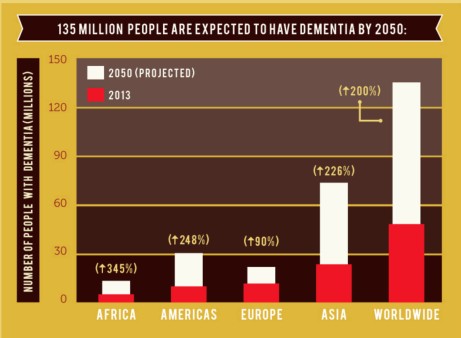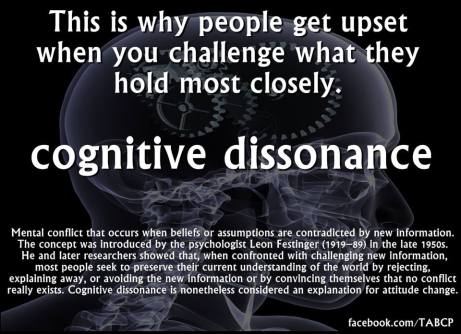Home » Posts tagged 'fundraising'
Tag Archives: fundraising
Fighting to make friends. On the dissonance in donation to dementia charities.
By 2006, Bush had convinced himself that the invasion of Iraq was not a mistake.
“I’ve never been more convinced that the decisions I made are the right decisions,” he told a delegation of conservative columnists.
If you wish to believe that there is a war against dementia, you will go round seeking information to support that belief.
See for example the information extract below from an ‘infographic‘.
This is known as a ‘confirmation bias‘.
A related phenomenon ‘cognitive dissonance‘ is the excessive mental stress and discomfort experienced by an individual who holds two or more contradictory beliefs, ideas, and/or values at the same time. This stress and discomfort may also arise within an individual who holds a belief and performs a contradictory action or reaction.
The magnitude of dissonance produced by two conflicting cognitions or actions (as well as the subsequent psychological distress) is likely to depend on the importance of cognitions. The more elements that are personally valued, the greater the magnitude of the dissonant relationship will be.
Cognitive dissonance theory is founded on the assumption that individuals seek consistency between their expectations and their reality.
Because of this, people engage in a process called dissonance reduction to bring their cognitions and actions in line with one another. This creation of uniformity allows for a lessening of psychological tension and distress.
And it’s been a popular tool in political messaging.
Leon Festinger’s theory of cognitive dissonance focuses on how humans strive for internal consistency.
A nice example of cognitive dissonance was recently provided by Alzheimer’s Australia:
According to Festinger, dissonance reduction can be achieved in three ways:
Attitude: “I am fighting a war against dementia and will avoid any unpleasant battles.”
Behaviour: I will donate money to further the fight against unfriendly communities.
1. Change behaviour/cognition
(Ex: “I will simply not donate any money.”)
2. Justify behaviour/cognition by changing the conflicting cognition
(Ex: “I’m allowed to donate money to take part in the fight every once in a while.“)
3. Justify behaviour/cognition by adding new cognitions
(Ex: “I’ll plan a trip to the cinema to take my mind off the fight against dementia.“)
There are various paradigms used to explore cognitive dissonance further.
Dissonance is aroused whenever individuals voluntarily engage in an unpleasant activity to achieve some desired goal. Dissonance can be reduced by exaggerating the desirability of the goal. Here an unpleasant activity might be reducing your bank balance to support the fight against dementia.
Aronson and Mills (1956) had individuals undergo a severe or mild “initiation” in order to become a member of a group. In the severe-initiation condition, the individuals engaged in an embarrassing activity. The group they joined turned out to be very dull and boring. The individuals in the severe-initiation condition evaluated the group as more interesting than the individuals in the mild-initiation condition.
All of the above paradigms continue to be used in fruitful research.
And cognitive dissonance can also act on the level where you make a donation, in your fight against dementia to establish a dementia-friendly community, but you subsequently have a ‘negative cognition’.
In a paper called “Donor Dissonance”: Applying Cognitive Dissonance Theory to Charitable Giving Behavior and Donor Relations” Mark Ward, Sr. from Clemson University helpfully looks at this phenomenon. In a nutshell, trying to reduce the amount of dissonance might make it more likely to donate to that charity in future.
Ward argues that “the more that post-decision dissonance is heightened by the importance of the issue at hand—and the longer the delay in deciding among equally appealing alternatives or the greater the difficulty of reversing the decision—the more individuals will have a need for reassurance.”
Quoting the work of Sweeney and colleagues (Sweeney et al., 2000), they say a fruitful avenue for exploration might be for fundraisers in charities to investigate the following affective and cognitive concerns among their major donors as follows.
Emotional: A person’s psychological discomfort subsequent to the donation decision
After I made this donation:
I was in despair
I resented it
I felt disappointed with myself I felt scared
I felt hollow
I felt angry
I felt uneasy
I felt I’d let myself down
I felt annoyed
I felt frustrated
I was in pain
I felt depressed
I felt furious with myself
I felt sick
I was in agony
Wisdom of donation: A person’s recognition after the donation has been made that the charity may not have needed the funds or that the person may not have selected the appropriate charity
I wonder:
if the charity really needed this money
if I should have donated anything at all
if I have made the right choice of donation amount if I have done the right thing in making this donation.
Concern over decision: A person’s recognition after the donation has been made that they may have been influenced against their own beliefs by the charity
After I bought this product I wondered:
if I’d been fooled
if they had spun me a line
if there was something wrong with the charity.
Clearly there’s a lot to examine there if they want to!
Some of it may lead to more effective manipulation of emotions by charities to fund-raise.
References
Sweeney, J. C., Hausknect, D., & Soutar, G. N. (2000). Cognitive dissonance after purchase: A multidimensional scale. Psychology & Marketing, 17(5), 369–385.
I am proud to support Dementia Awareness Day on September 15th 2015 on behalf of many
I have devoted a large part of my life to raising awareness of dementia. I have done a huge amount of independent research for this, having written a large number of book chapters, reviews and original articles on dementia, especially frontotemporal dementia.
I have recently even launched a blog on quality-of-life and wellbeing in dementia.
You can go to this blog here. You can also join us on Twitter here.
This celebrates the work being done by colleagues of mine in the academic community on aspects of wellbeing in dementia, including assistive technology and telecare, cognitive neurorehabilitation, built environments, end-of-life decision-making in dementia, definitions of wellbeing, ambient technologies, optimal design of the home, person-centred care, the socio-economic argument, and UK policy.
I am very happy to be writing a book drawing on the work of about ten prominent labs in the UK on this subject. It is a pity that real individuals with dementia or immediates, as well as hard working NHS doctors and nurses and academic researchers, are not given an opportunity to talk about their experiences. This field is dominated by professional third sector officers and their bosses looking for marketing chances sadly, but who do not have a strong working background specifically in this field otherwise.
However, I feel it is an extremely important area, and I am very proud to support it. I am off to an international conference in India in December 2012 for the World Federation of Neurology to discuss the subject with colleagues who are also experts in the field.
BAILII – worthy of your urgent attention
They say you’ll only miss something when it’s gone.
I hope people will not be saying this of BAILII – if it happens that due to market forces it goes into extinction. Market forces have already seen an uninspiring impact on the legal profession, though making certain CABx go into liquidation in a ‘survival of the fittest’ Darwinian legal-economic climate. Even the new model legal curriculum promises to see the unprofitable ends of law get elbowed out, whether this be immigration, housing, disability benefits or asylum, as the ‘wealth creators’ get shoehorned in, such as share acquisitions and private equity.
As a website, BAILLI may not look snazzy. It may not achieve millions on the London Stock Exchange in the near future. It does, however, offer an incredible resource for law and is entirely free-of-charge and public, meaning any member of the public can look up judgments. Try it – here.
You probably don’t want to go there to see lots of targeted ads anyway based on your demographic profile. You may wish to be able to read any judgment from recent years, if you believe in access-to-law for all. Yet, this amazing website is facing financial difficulty. I have spoken to Joseph Ury of BAILLI who is one of the most genuinely nice people you will ever meet. He continues to explain the situation with modesty and politeness, but never with an ounce of anger.
The thing about BAILII is that it typifies innovation, as a popular, easy-to-use, effective resource where the user feels utterly involved. BAILLI is not a simply static invention, a repository of useful and redundant information; it fosters a culture of discovery, research, knowledge transfer and knowledge sharing. It allows things like the ‘Medici Effect’ and the ‘next adjacent’ in innovation to happen for real – in other words, as a legal academic or legal practitioner, you can make groundbreaking connections between diverse subject areas which you never knew had existed.
If you think this is something worth supporting, I strongly urge you to go to the new Facebook page here.
And make sure you follow @BAILII on Twitter here!
Make yourself known, and contribute to something worth protecting in this ideologically-driven age of austerity.
Finally, I strongly recommend you to look at the work of my peers/colleagues in this regard:
Saving Private Bailii and the Legal Communication Revolution (by @ilegal)
http://ilegality.tumblr.com/post/24123840258/saving-private-bailii-and-the-legal-communication
Justice’s hidden backbone – a tribute to BAILII (by @adamwagner1)
http://ukhumanrightsblog.com/2010/11/18/justices-hidden-backbone-a-tribute-to-bailii/
BAILII – by @familoo
http://pinktape.co.uk/uncategorized/bailii/
BAILII needs your cash regularly (by @nearlylegal)
http://nearlylegal.co.uk/blog/2011/06/bailii-needs-your-cash-regularly/






